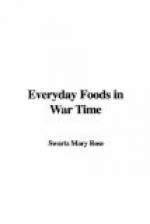Let us frankly recognize then that we eat meat because we like it—for its flavor and texture rather than any peculiar nourishing properties—and that it is only our patriotic self-denial or force of economic circumstances that induces us to forgo our accustomed amounts of a food which is pleasant and (in moderation) wholesome. We must save meat that the babies of the world may have milk to drink. Nowhere in Europe is there enough milk for babies today. A conservative request for one European city alone was a shipment of one million pounds of condensed milk per month! If cattle are killed for food there will be little milk to send and the babies will perish. We must save meat for our soldiers and sailors, because they need it more than we do. It is not only easily transported, but one of the few things to give zest to their necessarily limited fare. Fresh fruits and green vegetables, which may serve us as appetizers, are not to be found on the war fields. Dainty concoctions from cheese and nuts may provide for us flavor as well as nutriment, but meat is the alternative to the dull monotony of bread and beans for the soldier—the tonic of appetite, the stimulant to good digestion. We can scarcely send him anything to take its place.
We must save meat, too, as a general food economy. Meat is produced at the expense of grain, which we might eat ourselves. And the production of meat is a very wasteful process. Grains have a fuel value for man approximating 1,600 calories per pound. A pound of meat in the form of beef will require the consumption by the animal of some fourteen pounds of grain. The pound of beef will furnish perhaps 1,200 calories, while the grain consumed will represent over 20,000 calories. The production of milk from grain is only about one-third as expensive, so the purchase of three quarts of milk to one pound of meat is an economy in more ways than one.
Saving for the rest of the world will not be without some physical advantage to ourselves, if we have been accustomed to indulge in meat freely. Among the well-to-do meat eating is apt to be overdone to the extent of affecting the kidneys and the arteries, and some enforced restriction would be a real advantage to health, as has been demonstrated in other than war times. Because a food is good is no reason for unlimited quantities; an ounce of sugar a day is wholesome—a pound is likely to result in both indigestion and a badly balanced diet. A quarter of a pound of meat a day is not undesirable




